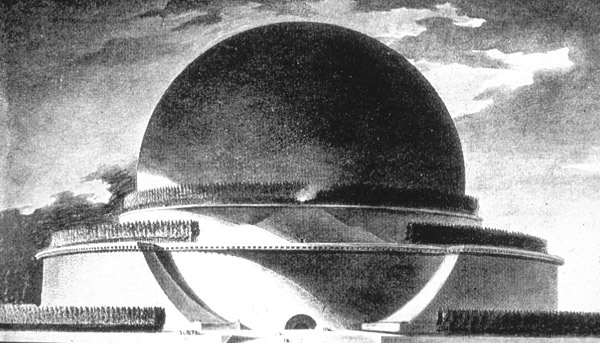Utopio, Ĉu Ne?
Hodiaŭ estas Dankotago en Usono. Mi dankas Dion por ĉio, inkluzive pro Esperanto.
Today is Thanksgiving in United States.
I thank God for everything, including Esperanto.

Étienne-Louis Boullée, “Cénotaphe à Newton” (1784) 1
La aŭtoro de Esperanto, Ludovic Lazarus Zamenhof, sciis ke multaj homoj rifuzos sian ideon. Do, li petas la mondajn legantojn formeti iujn ajn antaŭjuĝojn ke ili povus senti lerni artefaritan lingvon kiel Esperanto.
The author of Esperanto, Ludovic Lazarus Zamenhof,
realized a lot of people would reject his idea.
So, he asks the readers of the world to set aside
any initial prejudice they might feel about
learning an artificial language like Esperanto.
Jen, la rusa (skribitis Zamenhof 1887):
Предлагаемую брошюру читатель вероятно
возьмёт в руки с недоверием, с предвзятою мыслью,
что ему будет предложена какая нибудь несбыточная
утопия; я должен поэтому прежде всего
просить читателя отложить эту предвзятую
мысль и отнестись серьёзно и критически
к предлагаемому делу.
Jen Esperante (tradukis Zamenhof 1903):
La nun proponatan broŝuron la leganto
kredeble prenos en la manojn kun malkonfido,
kun antaŭe preta penso, ke al li estos proponata
ia neefektivigebla utopio; mi devas tial
antaŭ ĉio peti la leganton, ke li formetu
tiun ĉi antaŭjuĝon kaj ke li pripensu serioze
kaj kritike la proponatan aferon.
R.H. Geoghegan tradukis la rusan por anglaj legantoj (1889).
R.H. Geoghegan translated the Russian
for English readers.
The reader will doubtless take up this
little work with an incredulous smile,
supposing that he is about to peruse
the impracticable schemes of some good
citizen of Utopia. I would, therefore,
in the first place, beg of him to lay
aside all prejudice, and treat seriously
and critically the question brought before him.
Zamenhof indikis, ke li konscias, ke multaj homoj komence rifuzus Esperanton pro diversaj kialoj, sed li sentis, ke sia plano por internacia komuna lingvo ankoraŭ realiĝos. Lia unua eldono pri Esperanto, estas nomata Unua Libro, aŭ Unua Libro, kaj multaj tuj rekonis ĝin kiel grava provo krei tre lerneblan komunan lingvon por la tuta mondo.
Zamenhof indicated he was aware
that Esperanto would be initially
rejected by many people for various
reasons, but he felt his plan
for an international common language
could still be achieved. His
first publication about Esperanto,
is called the First Book, or Unua
Libro, and many immediately recognized
it as an important attempt
to create an easy to learn common
language for the whole world.
Ŝajnas, ke la lingvo travivis pro sia allogeco al sufiĉe da homoj en ĉiu generacio pasi ĝian historion kaj heredaĵon al ĉiuj sekvaj generacioj. Ĉar Zamenhof projektis intence la lingvon allogan, oni povus diri ke tio eble estis intencita aspekto de la tuta projekto proponita per Zamenhof. Mi dankas, ke li tiel faris.
The language seems to have survived due
to its attractiveness to enough people
in each generation to pass on its history
and inheritance to every following generation.
Since Zamenhof designed the language to be
attractive on purpose, one could say this
may have been an intentional aspect of
the entire project Zamenhof proposes.
I am thankful that he did so.
referencoj/references
-
Cenotaph Wikipedia Media ↩
-
Unua Libro por rusoj, 1887. ПРЕДИСЛОВИЕ (Foreword) https://ru.wikisource.org/wiki ↩
-
Zamenhof, “El la unua libro de la lingvo Esperanto” in Fundamenta Krestomatio, 1903. https://eo.m.wikisource.org/wiki/Fundamenta_Krestomatio/El_la_unua_libro_de_la_lingvo_Esperanto ↩
-
“Dr. Esperanto’s International Language”, translated by R.H. Geoghegan, 1889. http://www.genekeyes.com/Dr_Esperanto.html#Main ↩